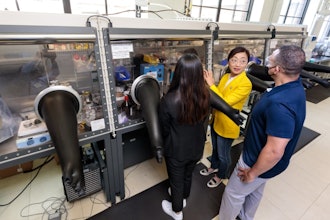The reduction of pesticide use in food production has resulted in increasing cases of consumers finding spiders in their produce.
Occurrences of shoppers discovering spiders lurking in grocery-store grapes have been reported throughout the Midwest over the past month — and the issue isn’t limited to one retail chain. Budget supermarket chain Aldi pulled all grapes from its Milwaukee locations after a consumer found a black widow spider in a package of grapes from an Aldi store in Wauwatosa, Wis.
Similar events happened at an Aldi store in St. Louis in October, and a Michigan family discovered a live spider in a bag of red grapes they purchased at a Kroger store in Brighton, Mich. This phenomenon seems to reach back as far as September, when a black widow was found in a shipment of grapes at a Minnesota school.
According to Milwaukee’s Journal Sentinel, black widows build webs in grape vineyards in order to capture insects attracted to the fruit. The prevalence of black widows being found in grapes has increased since the mid-1990s, when growers began to cut back on pesticide use. Grapes are commonly associated with heavy pesticide use, and the fruit still remains No. 3 on the Environmental Working Group’s (EWG) Dirty Dozen list of produce with the most pesticide residue. In the EWG’s latest Dirty Dozen study, a single grape tested positive for 15 pesticides.
Despite the fact that pesticide use is still commonplace in much of grape production, it appears that a reduction in insecticide use is resulting in markedly more spiders — especially black widows — showing up in grapes in the produce aisle. In addition to reduced pesticide use, spiders, such as the black widow, are often small enough to slip past inspectors examining harvested grapes.
Dwindling insecticide use also has caused more spiders to appear in another common fruit: bananas. In Britain, a family recently was forced from their home after discovering Brazilian wandering spiders on bananas purchased at a Sainsbury’s store. Brazilian wandering spiders are one of the most feared arachnids, thought by many to be the deadliest spider in the world. Native to South America, Brazilian wandering spiders often are called banana spiders because they commonly reside in banana trees. These spiders have been discovered in banana shipments more than once. In 2011, a Brazilian wandering spider was found in a supermarket in Germany, resulting in the evacuation of the store.
While spider prevention in produce may prove difficult without the use of pesticides, pest control company McCloud Services says there are steps businesses can take to help control spiders in food harvesting and processing areas. Companies should work to reduce the amount of clutter in work areas, and any webs, spiders or spider egg sacs should be vacuumed for removal. McCloud recommends that gloves be worn at all times when handling items where black widow spiders or other dangerous arachnids are suspected, including firewood and storage boxes.
Using these preventative measures, both growers and food manufacturers can help minimize the occurrence of spiders in their produce, helping increase consumer safety — and preventing an unwelcome shock at the supermarket.






















